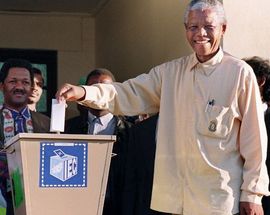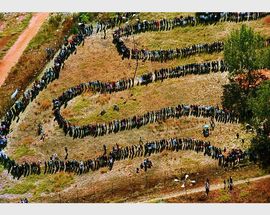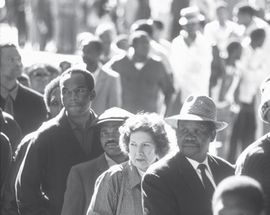Public Holidays in South Africa - Freedom Day
22 Apr 2024Nelson Mandela, who became South Africa's first democratically elected president, said of the elections; "The birth of our South African nation has, like any other, passed through a long and often painful process. The ultimate goal of a better life has yet to be realised. On this day, you, the people, took your destiny into your own hands. You decided that nothing would prevent you from exercising your hard-won right to elect a government of your choice. Your patience, your discipline, your single-minded purposefulness have become a legend throughout the world...”.
FRAUGHT NEGOTIATIONS
The elections came about after long and tense negotiations held between 1991 and 1993 between the nationalist South African government and liberation movements such as the African National Congress (ANC) and the South African Communist Party (SACP). The negotiations, known as the CODESA talks, took place at the World Trade Centre in Kempton Park (now the Emperor's Palace casino and entertainment complex).
As the country tentatively stepped towards democracy, ethnic and political tensions flared up in South African townships fuelled by a state-sponsored so-called 'third force' who supplied weapons to warlords seeking to create chaos and unrest in the country's poorest townships. Violent clashes were seen particularly in parts of KwaZulu Natal where the Inkatha Freedom Party (IFP) had become fierce rivals of the ANC and where both parties faced violent opposition as they campaigned for support.
Then on April 10, 1993 Chris Hani, leader of the SACP, was assassinated on his doorstep by a white nationalist and there were fears that the devastating event could spark increased violence, and even civil war. Nelson Mandela addressed the nation and appealed for calm in what was a moment of unspeakable tension across the country; "The cold-blooded murder of Chris Hani has sent shock waves throughout the country and the world. ... Now is the time for all South Africans to stand together against those who, from any quarter, wish to destroy what Chris Hani gave his life for – the freedom of all of us."
Following Hani's murder, the negotiating parties were further galvanised into taking decisive action to conclude peaceful talks to end apartheid. Finally in the early hours of the morning of 18 November, 1993 an interim constitution was ratified and it was agreed that on April 27, 1994 for the first time in history, South Africa would hold a free, fair and democratic election.
THE PATH TO A FREE AND FAIR ELECTION
The Independent Electoral Commission (IEC) oversaw the task of ensuring a free and fair election could take place. Numerous factors had to be considered, not least the fact that the black South African population had never taken part in an election before. Many voters were undocumented and there was a worry that, particularly in rural areas, illiterate voters may be vulnerable to manipulation.
Furthermore in the South African 'homelands' or Bantustans of KwaZulu, Bophuthatswana, and Ciskei, apartheid-era homeland leaders and their security forces had harassed and intimidated ANC supporters. In the homeland of Bophuthatswana, the situation reached crisis point when on March 7 the Bophuthatswana president announced that they would boycott the South African general elections. The announcement led to a civil service strike and a mutiny in the local armed forces and four days later President Mangope reversed his decision, only to change his mind again on March 12, at which point the South African Defence Force (SADF) responded by deposing him and restoring order to the region.
When the day finally arrived the IEC helped monitor the more-than 9,000 polling stations across the country, many of which stayed open for days to allow the unprecedented numbers of voters access to the polling booths. The first democratic election was peacefully met with joy and euphoria across the country and on May 10, 1994 Nelson Mandela was officially sworn in at the Union Buildings in Pretoria as the first democratically elected president of the new South Africa.
SIGHTS AND MUSEUMS
APARTHEID MUSEUM This extraordinary museum brings to life the horrors of apartheid: from the petty cruelties inflicted on the everyday lives of black South Africans during that time to state repression and violence, and details the extraordinary story of South Africa's struggle for democracy.
CONSTITUTION HILL Visit this national heritage landmark to learn about the shocking history of the apartheid prison system and the many ordinary South Africans and political prisoners who were once incarcerated here. This is also the place to come to see the successful working of democracy as enshrined in the inspiring, modern Constitutional Court which is located here.
For an in-depth look at the dramatic events surrounding the first democratic South African election, check out the excellent eNCA documentary 1994 The Bloody Miracle.







Comments